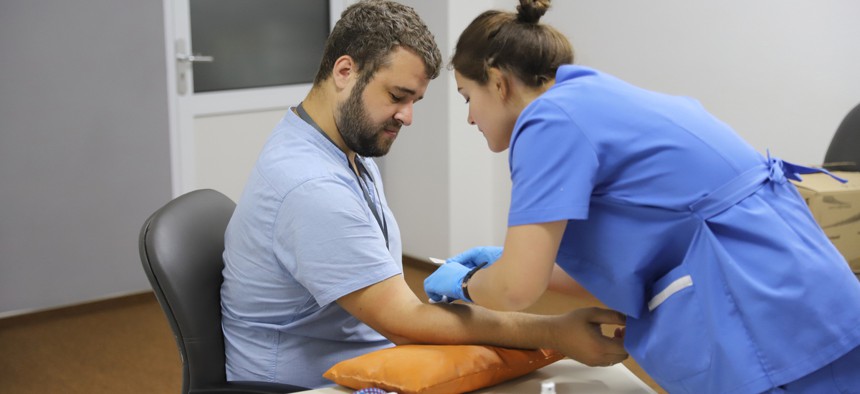Activists and Lawmakers Call for an End to Ban on Gay Men Donating Blood

There is a nationwide shortage of blood due the coronavirus pandemic. Shutterstock
Sexually active gay and bisexual men are banned from donating blood. With blood in short supply because of the coronavirus pandemic, advocates are renewing a push to change those restrictions.
As the coronavirus pandemic leads to social distancing and shelter-in-place mandates, many Americans have not been able to give blood this month, resulting in a nationwide blood shortage. But members of one community say they are ready and willing to donate—as long as the U.S. Food and Drug Administration allows them to.
In order to be eligible, gay and bisexual men must be celibate for one year prior to making a donation, a federal policy meant to reduce the rate of HIV transmission through blood transfusions. LGBTQ advocates and at least one state lawmaker are calling on the FDA to change that requirement, calling it scientifically unnecessary and dangerous during a pandemic.
Sarah Kate Ellis, president of the LGBTQ rights organization GLAAD, said in a statement that the gay and bisexual men are eager to help and “should be able to contribute” to blood donation efforts. “The FDA needs to put science above stigma," she said. "Leading medical experts have highlighted for years that the ban is ineffective and doesn’t rely on science.”
The blood ban was enacted during the HIV/AIDS epidemic of the 1980s when testing for blood-borne infections was not nearly as advanced as it is today. FDA screening procedures are now able to discover the presence of the virus in donated blood within 11 days of infection. One study of blood donations found that only 1 in every 3.1 million donations of HIV-infected blood made it past screening efforts.
Proponents of the ban argue that is necessary because gay and bisexual men make up about 70% of new infections each year, though that number is relatively low, at 26,000 cases.
The FDA previously imposed a lifetime ban on donations for any men who have had sex with other men, but that was reduced to a 12-month ban in 2015. A study released this month found that there was no increase in HIV infections spread through blood transfusions since the policy was revised.
The American Red Cross, the leading organizer of blood drives in the country, released a statement in November saying that “blood donation eligibility should not be determined by methods that are based upon sexual orientation,” and recommended reducing the ban on gay and bisexual men from 12 months to three months as an interim step.
The organization canceled 2,700 blood drives in the past month, resulting in 86,000 fewer donations than expected. The organization warned that the blood shortage wouldn’t just impact people who need treatment for the coronavirus, but also people who need emergency surgery, like victims of car accidents, and patients who have cancer. "Without a readily available blood supply for patients in need, doctors may have to make tough choices about who receives lifesaving blood products during this challenging time," the group said in a statement.
Last Thursday, U.S. Surgeon General Dr. Jerome Adams encouraged people to donate blood to help combat the shortage. "One thing we should all consider, especially our millennials and, is donating blood,” he said at a press conference. “Blood centers are open now and in need of your donation... Social distancing does not have to mean social disengagement. So give blood, today.”
The Red Cross released new guidelines about blood donations during the pandemic this month. People who have tested positive for coronavirus or are living with someone who has tested positive are being asked to wait at least 28 days after symptoms resolve before donating. People who have traveled to places like China and Italy are also being asked to wait at least 28 days until after their return flight. According to the group, there have been no recorded cases where coronavirus was transmitted through a blood transfusion.
At least one state lawmaker has joined the chorus calling for the FDA to lift its ban on blood donations from members of the LGBTQ community. California Sen. Scott Wiener, a Democrat from San Francisco, said the ban is dangerous during a pandemic.
“As a result of the COVID-19 pandemic and the resulting stay-at-home orders and social distancing rules, our blood banks are experiencing a severe blood shortage and desperately need blood donations,” Wiener said in a statement. “This blood shortage threatens lives. Yet, despite this emergency need, the FDA continues to take a non-science-based approach by irrationally excluding sexually active gay and bisexual men from donating.”
Weiner, who is a gay married man, said that the FDA’s blood testing protocols make the policy irrelevant because they can easily detect the presence of HIV and other illnesses. “I, for one, would love to donate blood to help out in this time of need, but because I’m a gay man and have not been celibate for the past year, I’m prohibited,” he said. “We’re in a national and global healthcare emergency, and it’s all hands on deck.”
Weiner also called for an end to the ban in 2014, when he was a supervisor for the city of San Francisco. Back then, he said that “while it’s important to have guidelines ensuring that blood donors are not engaging in risky behaviors” sexual orientation should not be used as a predictor for risk.
An FDA spokesperson said that the rules have not changed, but that the agency will "continue to re-evaluate the situation as the outbreak progresses.”
OTHER STORIES from Route Fifty:
NEXT STORY: Salt Lake City Cracks Down on Large Groups Greeting Missionaries at Airport






